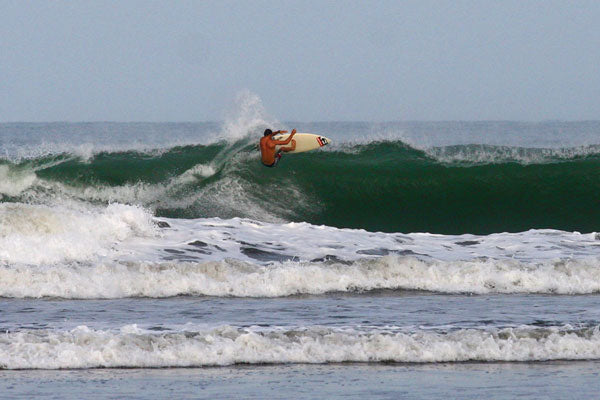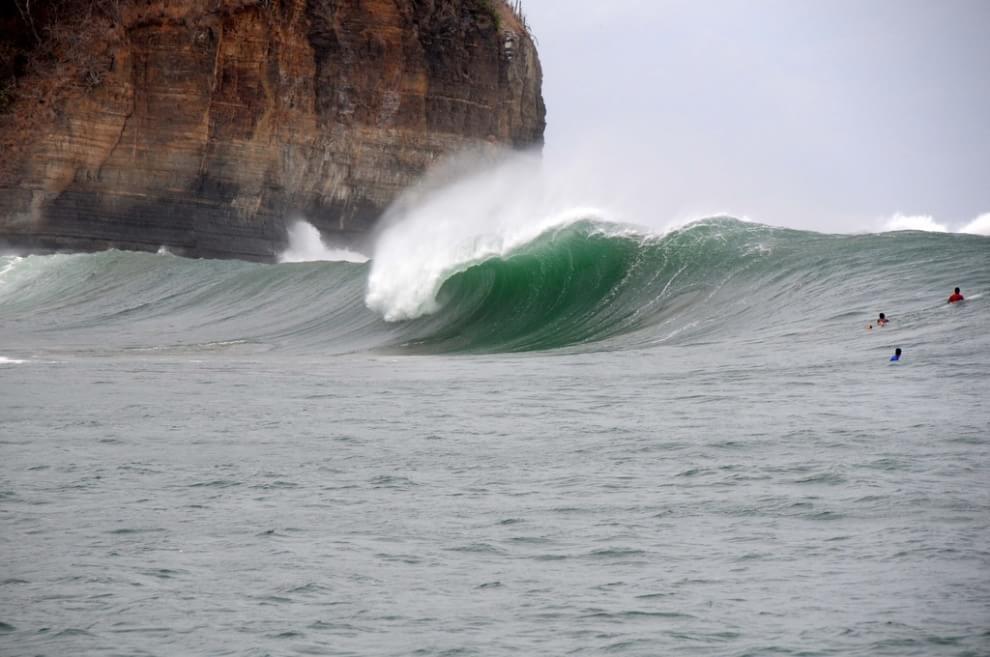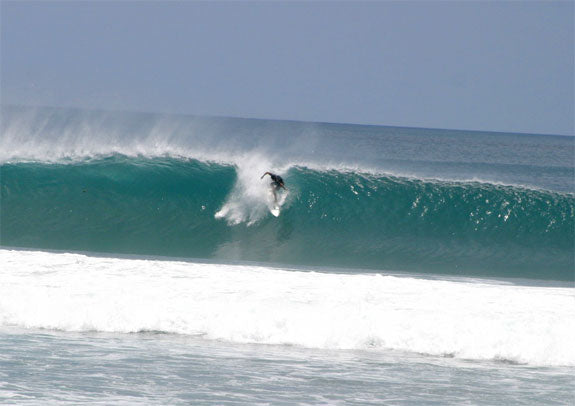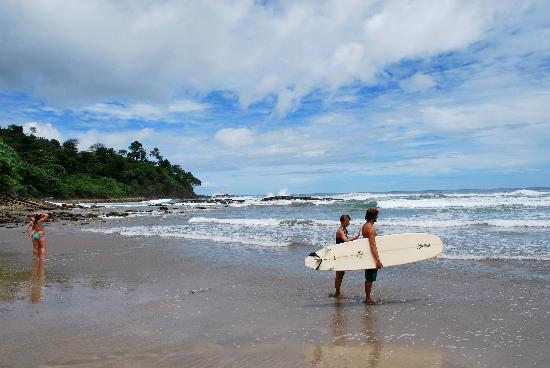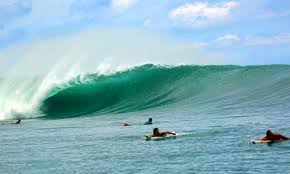Surfing in Nicaragua
The Best Things About Surfing in Nicaragua
Nicaragua is a top surf destination because of the general consistency of the waves and good weather conditions. There are ride-able waves almost every single day. In the southern region, offshore winds blow all day long for an average of 300+ days per year.
Spots in this zone are greatly preferred for surfing, but there are waves up-and-down the coast. Nicaragua has some of the best quality waves in all of Central America, mainly due to the long sweeping beaches and rivers.
Some waves are just better than others, but the better waves attract more people. Like in many other countries, the best and most popular spots are the most crowded. While it might not matter to a pro surfer, most of us would rather not fight for waves.
Nicaragua has so many surf spots which offer quality waves with less crowd compared to it's cousin Costa Rica to the south. Nicaragua offers plenty of waves that appeal to a wide range of skill levels.
![]() For many, a hollow wave is better than a mushy wave, and hollow waves are the trademark of Nicaragua.
For many, a hollow wave is better than a mushy wave, and hollow waves are the trademark of Nicaragua.
| Here are the information you'll find in this guide that can help you plan your next surf trip to Nicaragua: |
Top Surf Spots of Nicaragua
There are many major surf spots in Nicaragua. Among them are some popular spots that are listed below:
Playa Hermosa
Surfing Playa Hermosa
Playa Hermosa is one of the best kept secrets South of San Juan Del Sur. Playa Hermosa is over 1 mile long and is accessible only by boat and features lots of empty peaks with no local surfers!
The wave quality is better than average and features lots of peaks, long walls, and the occasional barrel. This spot is fun for almost all skill levels. Because it is located South of SJDS, Playa Hermosa needs more swell than others to break, but this touch of inconsistency is more than offset by the lack of people in the line-up. You will never have to share a peak here if you don’t want to.
![]() If you are coming to Nicaragua to surf alone, stay in SJDS and take the short boat ride to surf Playa Hermosa. The best months are April through September. Mid to high tides are best. Please be cautious while travelling in these beaches.
If you are coming to Nicaragua to surf alone, stay in SJDS and take the short boat ride to surf Playa Hermosa. The best months are April through September. Mid to high tides are best. Please be cautious while travelling in these beaches.
![]() Watch out for empty peaks
Watch out for empty peaks
Aschunchillo
Surfing Aschunchillo
Aschunchillo is a lesser known spot located in Central Nicaragua. It is a consistent beach break, located just outside of the offshore wind corridor and only 1.5 hours from MGA International.
As such, it’s best to try and surf it in the mornings when the winds are light. The wave is fun and rip-able and occasionally lines up for some sick hallow sections off the river mouth. If you want fun, but non-threatening waves and absolutely no crowds to hassle with, this is the wave for you.
![]() Access the wave through Gran Pacifica and make your way North. The best peaks can be found a short walk to the North of the parking area, in front of the river mouth. It’s best surfed on a lower tide. You can also drive straight to the beach by paying the guards $5 at the entrance.
Access the wave through Gran Pacifica and make your way North. The best peaks can be found a short walk to the North of the parking area, in front of the river mouth. It’s best surfed on a lower tide. You can also drive straight to the beach by paying the guards $5 at the entrance.
The two best places to stay are Gran Pacifica or the Los Cardones Eco Lodge down the road. For more amenities closer to the break, the Grand Pacifica is the spot. There is a good wave right out front or you can walk to Aschunchillo.
I stayed at Los Cardones once and it is very rustic compared to the Grand Pacifica. There are a good group of people that hang out there but the rooms are sub-par in my opinion. If you are going to stay there, grab one of the rentals on the property.
![]() Watch out for the black sand. Beach can get very hot in the sun.
Watch out for the black sand. Beach can get very hot in the sun.
Astillero Beach Break
Surfing Astillero Beach Break
At the end of the road, in front of the river mouth, lies one of the best and least surfed beach breaks in Nicaragua. Astillero is a small fishing village, but it is also known for it’s hollow waves and lack of crowds.
It’s best surfed when there is a little bit of swell in the water as it is usually a bit smaller here. The rights are usually better than the lefts and there are multiple peaks to choose from—works best when it’s double overhead or less and around a mid-tide.
![]() Get a 4wd and drive down the beach—you can park in front of the wave and avoid the long walk. Be careful not to get caught by the high-tide.
Get a 4wd and drive down the beach—you can park in front of the wave and avoid the long walk. Be careful not to get caught by the high-tide.
![]() Watch out for the dirty water during the rainy season and petty theft if you leave your vehicle unattended.
Watch out for the dirty water during the rainy season and petty theft if you leave your vehicle unattended.
Playgrounds
Surfing Playgrounds
As the name indicates, this spot is one of the most fun and rippable waves we have in Nicaragua. Breaking across a cobblestone reef, Playgrounds is often compared to a warm-water Trestles.
The left is usually longer than the right, but you can easily go both ways. Equally fun on long boards and short boards, Playgrounds is a wave that a broad range of people can enjoy.
This wave starts getting fun at about chest-high and holds size up to double-overhead. Playgrounds is a boat-only spot and while there can sometimes be a few people in the line-up, you can also surf here by yourself. Stay anywhere in Tola with boat access.
To score it without the crowds, try surfing Playgrounds in between swells during the season. It’s usually better in the morning or with light winds.
![]() Watch out for the rocks! Don’t put your foot down unless you want to take home a battle scar.
Watch out for the rocks! Don’t put your foot down unless you want to take home a battle scar.
Playa Colorado
If you want to get barreled, Playa Colorado is the place to visit in Nicaragua. The secret is out and you won’t be surfing this spot alone but if it turns on, you will likely get one of the best barrels of your life.
Playa Colorado is a private beach and is accessed by either staying inside Hacienda Iguana (a private beach and golf resort) or by boat. This wave can work on all tides, changes personalities frequently, and can dish out a beating.
Surfing Playa Colorado
Stay inside Hacienda Iguana if you want to score Playa Colorado – if you can time the boats and the crowd you can still score an empty line-up here. Bring your paddle arms and an extra board or two!
![]() Watch out for boats, Santana Walkers, and other eager surf-trippers who will all paddle out and sit right next to you.
Watch out for boats, Santana Walkers, and other eager surf-trippers who will all paddle out and sit right next to you.
Playa Santana
Surfing Playa Santana
A wedgy beach break that almost always has a fun peak. Playa Santana is best known for its consistency and wave quality. On small swell pulses, this break is punchy and rampy. When the swell get’s bigger, it’s a full-on barrel-fest.
If there’s one bummer about Playa Santana, it’s the crowd of locals that live in adjacent Limon. It’s rare to surf this spot alone and if it’s good, you could be battling 40 heads for a peak.
![]() The wave turns on at mid to high tide and stays fun until about mid-tide going out. If you want to beat the crowd, try waiting until after high-tide to paddle out. Early season, when the water is cool, also cuts down some of the crowd.
The wave turns on at mid to high tide and stays fun until about mid-tide going out. If you want to beat the crowd, try waiting until after high-tide to paddle out. Early season, when the water is cool, also cuts down some of the crowd.
Playa Maderas
Surfing Playa Maderas
Playa Maderas, the most popular surfing beach near San Juan Del Sur is predominately a beach break and breaks year-round. It’s a rippable wave that caters to a variety of surfing abilities. Maderas is famous for its consistency and wave quality .
San Juan Del Sur is home to many local rippers as well as busloads of wannabe surfers so expect to share the line-up when you are here.
If you zig when all the other’s zag, you can still get fun and uncrowded waves at Playa Maderas. When the swell is small, try showing up at low-tide. You’ll most likely have the beach to yourself and there will be some fun corners to ride. This also works when the swell is BIG, when most people go surf somewhere else, and it’s too much for the casual surfer to handle.
![]() Watch out for other surfers and submerged rocks!
Watch out for other surfers and submerged rocks!
Popoyo
Surfing Popoyo
Popoyo is a staple and it’s the wave that put Nicaragua on the surfing map. This powerful reef break goes both left and right (the left is usually better) and offers long, powerful walls and sometimes a thick barrel section.
It’s very consistent and magnifies even the smallest swell. As you might imagine, there is a pack of locals and ex-pats alike who have this place wired. It’s a shifty wave, but it’s only one peak so competition for your daily quota is guaranteed here. This wave breaks over shallow reef, so take that into consideration as well.
![]() Popoyo breaks at all tides but most people tend to prefer high tide. Give low tide a try, with a smaller swell, and you will be rewarded. Otherwise, try Popoyo during a long stretch of good surf (the crowd will be tired and Panga Dropsmellow) or in the off-season.
Popoyo breaks at all tides but most people tend to prefer high tide. Give low tide a try, with a smaller swell, and you will be rewarded. Otherwise, try Popoyo during a long stretch of good surf (the crowd will be tired and Panga Dropsmellow) or in the off-season.
Panga Drops
If you want a solid wave across all of the criteria, look no further than Panga Drops. This isn’t the best wave in Nicaragua by any means, but if you value a wave that is fun most of the time, doesn’t really ever get too crowded, and can be enjoyed by most skill levels, you have to consider Panga Drops.
Located at the north end of Playa Colorado, this wave is a deep-water, horseshoe reef which magnifies swell and throws shifty lefts and rights at you. It breaks at all tides, on all swells and all times of the year. You should definitely try it when visiting Nicaragua.
Surfing Panga Drops
Panga Drops breaks pretty far out and is affected by strong offshore winds, most common in the off-season. Try checking it out on a solid swell with light or no-wind and you’ll be trading big, shifty peaks with just a few friends.
![]() Watch out for stingrays and strong currents!
Watch out for stingrays and strong currents!
Best Places to Stay and Surf in Nicaragua
Casa de Safari
This house is located within easy access to most surfing beaches. They arrange airport transportation, arrange for surf lessons, board rentals, and more.
Popoyo Surf Lodge
Popoyo Surf Lodge is nestled into the valleys of Nicaragua's southern Pacific coast in Playa Guasacate. PSL rests on a 14-acre spread of tropical gardens, amidst a surfer's paradise, intimate and personal, with access to a seemingly endless supply of world class surf breaks.
These breaks receive year round swell from the southern hemi's and the waves are groomed to perfection by the consistent, prevailing offshore winds. Here you get to experience an unparalleled knowledge of the waves, the breaks, and the local community.
NSR Surf Reports
NSR has scoured the coast of Nicaragua to find the very best places for surfers to stay. All rental properties include access to killer waves. They are perfect for all surf trips. If you're looking to minimize your travel time and maximize your surf time, stay with Nicaragua Surf Report (NSR) - beach rentals with waves!
Villa Pinolera
Villa Pinolera is a beautiful private residence located in trees, only steps from Maderas Beach and 15 minutes outside San Juan Del Sur. You can be here within 3 hours of arriving at Managua International Airport. Villa Pinolera is a full service rental, complete with housekeeper, 24-hour security guard, and even a meal plan service providing three delicious and freshly prepared meals per day.
Surfari Charters
Surfari Charters
Surfari Charters provide professional guided transportation on the Pacific Coast of Nicaragua for hard core surfers and fishermen, with a family style twist.
Casa Cantamar
Casa Cantamar is one of the few truly beach front homes available for vacation rental in this area. It is situated on perhaps Nicaragua's most beautiful stretch of sand, and is conveniently located right between two premiere surf breaks. This property is located near Panga Drops, Playa Colorado, and Los Perros. Board rentals available on request.
Getting to Nicaragua
If arriving on an international flight, you’ll land at Augusto C. Sandino International Airport (MGA) in Managua. As well as flights from neighboring capitals such as San José and San Salvador (served mainly by COPA and TACA), Managua receives direct flights from major US hubs Atlanta, Miami, and Houston through Spirit Airlines, Continental, American Airlines, and Delta.
You can enter Nicaragua by land from Honduras and Costa Rica. International buses pull into Managua, often via Granada and Rivas (if coming from the south); it’s also possible to take local services to and from the border.
There is a water crossing from the border at Los Chiles, Costa Rica, to San Carlos; from here it is a five to seven-hour bus ride or an hour-long plane ride on to Managua. It is also possible to cross from La Unión in El Salvador to Potosí in Nicaragua, either by arranging to cross with local fishermen, or with the passenger service Cruce del Golfo.
Accomodations in Nicaragua
Most budget travelers to Nicaragua at some point find themselves in a Nicaraguan hospedaje – a small and usually pretty basic pension-type hotel, most often family-owned and run. Simple hospedajes charge around US$5–15 for a double. For this you get a bed and fan; in many places, you’ll have to share a bathroom, and breakfast is not normally included.
Hostels (US$5–10 for a dorm bed) are common in backpacker hot spots like León and Granada but rare elsewhere. Hotels (from US$20) tend to be more luxurious, with air conditioning, cable TV, and services like tours and car rental; you are less likely to see these in very small towns.
Camping is pretty rare, thanks to the low cost of accommodation. If you’re determined to camp, the most promising areas are beach spots around San Juan del Sur, Isla de Ometepe, and the Corn Islands.
Resources:



